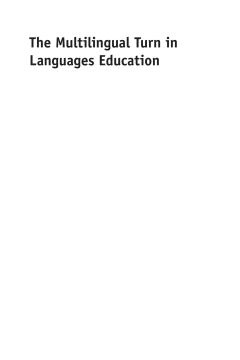
Additional Information
Book Details
Abstract
Starting from the key idea that learners and teachers bring diverse linguistic knowledge and resources to education, this book establishes and explores the concept of the ‘multilingual turn’ in languages education and the potential benefits for individuals and societies. It takes account of recent research, policy and practice in the fields of bilingual and multilingual education as well as foreign and second language education. The chapters integrate theory and practice, bringing together researchers and practitioners from five continents to illustrate the effects of the multilingual turn in society and evaluate the opportunities and challenges of implementing multilingual curricula and activities in a variety of classrooms. Based on the examples featured, the editors invite students, teachers, teacher educators and researchers to reflect on their own work and to evaluate the relevance and applicability of the multilingual turn in their own contexts.
Drawing on recent theoretical developments in sociolinguistics, this charming and important book reminds us once again of how our schools can value and build on multilingualism, and why it is important that they do so if we want more socially just education for not only multilingual learners but ALL learners.
Dr. Jean Conteh is Senior Lecturer in the School of Education at the University of Leeds, UK. Her research interests include EAL in the British system and teacher development and professional knowledge. Dr. Gabriela Meier is a Lecturer in Language Education at the Graduate School of Education, University of Exeter, UK. She is especially interested in language education and social cohesion, including bilingual and multilingual approaches to learning.
This volume is a very welcome addition to a number of recent books on multilingual pedagogy and is a must for teacher educators/researchers and students of applied linguistics who wish to rethink their approach to languages education and embrace linguistic and cultural diversity as a resource to implement equality and social cohesion in their classrooms.
Conteh & Meier’s important volume builds and expands upon recent key developments that have increasingly problematized and contested the monolingual norm that still underpins so much theory, pedagogy and practice in language teaching and learning. With an emphasis on schools and pedagogical practices, the volume solidifies and exemplifies how 'the multilingual turn' in education can make a difference for all, especially for those whose multilingualism has been ignored and/or pathologized until now. Like the multilingual turn itself, this volume provides us with a timely and important intervention into the theory, practice and pedagogies needed for a multilingual, globalized world – and not before time.
Table of Contents
| Section Title | Page | Action | Price |
|---|---|---|---|
| Contents | v | ||
| Contributors | vii | ||
| Acknowledgments | xiii | ||
| Foreword | xv | ||
| Introduction | 1 | ||
| Part 1 Societal Perspectives on the Multilingual Turn in Language(s) Education | 15 | ||
| 1 Socialized into Multilingualism: A Case Study of a Mauritian Pre-school | 17 | ||
| 2 Exploring the -lingual Between Bi and Mono: Young People and Their Languages in an Australian Context | 41 | ||
| 3 Multilingualism as Portrayed in a Chinese English Textbook | 64 | ||
| 4 Looking Through the Language Lens: Monolingual Taint or Plurilingual Tint? | 89 | ||
| Part 2 Perspectives on the Multilingual Turn in Education | 111 | ||
| 5 From Normalization to Didactization of Multilingualism: European and Francophone Research at the Crossroads Between Linguistics and Didactics | 113 | ||
| 6 Our Mother Tongue is Plurilingualism: A Framework of Orientations for Integrated Multilingual Curricula | 132 | ||
| 7 Multilingual Teachers’ Resources in Three Different Contexts: Empowering Learning | 158 | ||
| 8 Multilingualism and Social Cohesion: Two-way Immersion Education Meets Diverse Needs | 179 | ||
| Part 3 Visions of the Multilingual Turn in Pedagogy and Practice | 209 | ||
| 9 Multilingual Pedagogy in Primary Settings: From the Margins to the Mainstream | 211 | ||
| 10 Plurilingualism and Empathy: Beyond Instrumental Language Learning | 234 | ||
| 11 Translanguaging as Process and Pedagogy: Developing the English Writing of Japanese Students in the US | 258 | ||
| 12 Transforming Learning, Building Identities: Arts-based Creativity in the Community Languages Classroom | 278 | ||
| Conclusion: The Multilingual Turn in Languages Education | 292 | ||
| Author Index | 300 | ||
| Subject Index | 301 |
